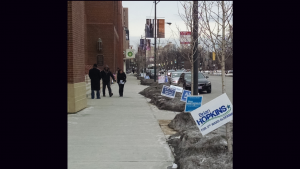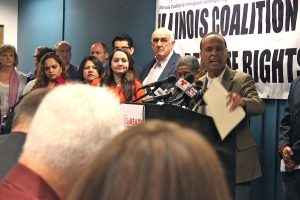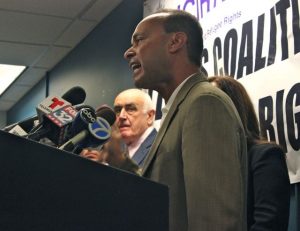Tax increases for the wealthy, birth control coverage, and a minimum-wage increase were three important referendums being voted on Tuesday in Chicago as part of the midterm election, which also included the Illinois governor’s race.

According to the Chicago Tribune, the number of early ballots cast in the Chicago and Cook County area rose from 170,000 in 2010 to 242,000 this year. There also was a jump in the number of mail-in ballots, with this year’s being 66,174 as opposed to 2010s 49,000. It is expected that there will be an increase in overall Illinois voter turnout this year.
“I felt like this ballot was very important, and it affects me and many other people,” said Shayann Trip, a student voter at the 1118 S. Michigan Ave. polling place in the city’s South Loop neighborhood.
The “millionaire tax” referendums would introduce a 3 percent tax increase on incomes of $1 million or more. This additional percentage would go to benefit schools.
“It makes sense to have schools benefit from millionaires,” said Ed Farrish, 46. “It’s not like they can’t afford it.”
Not everyone agreed with Farrish.
“They earned their money,” said Rachel Grayson, a 24-year-old first-time voter. “Why should they be penalized?”
The birth control initiative would require employers to include birth control in their health insurance plan. This issue reared its head after the Supreme Court ruled that a company could opt out of providing birth control coverage because of religious objections.
For Dana Wren, a 32-year-old bank employee, health coverage is essential and she believes it shouldn’t exclude women’s health items like birth control.
“It should not be excluded or ignored by our employers,” she said. “How is that fair?”
Tyrell Oden, a Roosevelt University graduate student, agreed with Wren, saying that the absence of birth control in health care plans is problematic.
“I think is just boils down to equality and traditionalism,” said Oden.
“The issue of birth is up to us as women, not white-haired men in the government,” said Wren.
The proposed Illinois minimum wage increase would raise it from $8.25 to $10. This initiative has been at the center of Gov. Pat Quinn’s re-election campaign, said the St. Louis Post-Dispatch.
“How sad is it that we are just now voting for this in 2014?” said Trip.
“Of course we need to make minimum wage be able to sustain people,” said Oden.
Perhaps one of the biggest items on this year’s ballot is the closely watched governor’s race. The polls have been neck-and-neck between Quinn and his Republican challenger Bruce Rauner.
According to WGN, the last pre-election poll had the two candidate pitted against each other with a 48 percent tie.
“It’s so hard to tell who can win,” said Grayson. “It’s just too close.”
Farrish isn’t voting in the governor’s race because he was very dismayed by the candidates’ campaign ads.
“Personally, when I see those negative TV ads, it doesn’t make me want to vote for one candidate or the other,” he said. “It just makes me upset and not want to vote at all.”
Wren agreed, saying that the negative media taints the democracy of free elections.
“It’s so much more of a money game,” she said. “Who can out-buy who?”












Be First to Comment